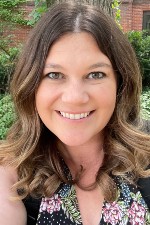Tamara Masters, PhD, joined CEED in 2024 as TARSS program manager. In this Q & A, she describes how her career and educational pathway have allowed her to experience many different facets of the early childhood field. She also shares her thoughts on the vital work that educators do in early childhood classrooms–and why routines and relationships are key to children’s development.

Tell us about the journey that brought you to your current role at CEED.
TM: My love of the early childhood education field began at a very young age. I am privileged to have found many ways to explore my love of working with children. I began my career as a classroom teacher of different age groups (infants, first grade, and third grade). Then, after spending two years as a stay-at-home mom, I rejoined the workforce as an Early Head Start home visitor. My work in Head Start expanded as an instructional coach for teachers working with children aged birth through five and included child care partnerships in Des Moines, Iowa. I continued my education and eventually completed my PhD in education leadership at Drake University in Des Moines. For the past four years, I worked as a college professor, teaching all early childhood education courses at Central College, a small liberal arts college in Pella, Iowa. My family relocated to Minnesota this past summer and I was happy to join the TARSS team in June.
What does your role at CEED entail?
As TARSS project manager, I lead the day-to-day operations of the TARSS program. I focus on our work plan, policies, and procedures, and on ensuring our contract deliverables are met. I also collaborate with partners across the state such as Achieve; Develop; Child Care Aware; Minnesota’s new Department of Children, Youth, and Families; and many others.
What is new for you in your position?
The aspect of my job that is the newest for me is familiarizing myself with the early childhood education landscape within the state of Minnesota. I grew up in Lino Lakes, but I lived out of state for 20 years (in Nebraska for eight years and in Iowa for 12 years). Since moving home, I have focused on learning about the many systems and supports available to educators in Minnesota.
TARSS exists to serve the trainers, coaches and RBPD specialists who work with early childhood educators throughout Minnesota. Why is the training and professional development that they provide so important for the early childhood workforce?
Early childhood professionals serve the most vulnerable population. 90% of brain development occurs within the first five years of life. Since babies learn through everyday interactions, it is critical that ECE professionals understand the importance of each interaction. Having a system of training and professional development allows educators to learn about new research and stay up-to-date with best practices. That, in turn, helps educators deliver high quality early experiences that we know make an impact on children’s lives.
What don’t a lot of people know about early childhood education?
For those who aren’t familiar with what goes into caring for young children, I like to highlight the importance of routines and relationships. This goes back to all those brain connections that are being built during the first five years of life. Supporting children’s healthy development in the early years is all about consistency. Building routines into the day helps babies learn patterns and see the world in a predictable way (helping with self-regulation). Relationships are the same; they build trust, which allows children to explore and learn from their environment. Working in early childhood means creating those safe environments for children to explore and learn, which is the foundation of all future learning. The impact our field has on each and every community is very beautiful.
What are some of your interests and hobbies outside of work?
In my spare time, I spend a lot of time cheering for the Minnesota Twins, playing piano, and taking tap dancing classes.

